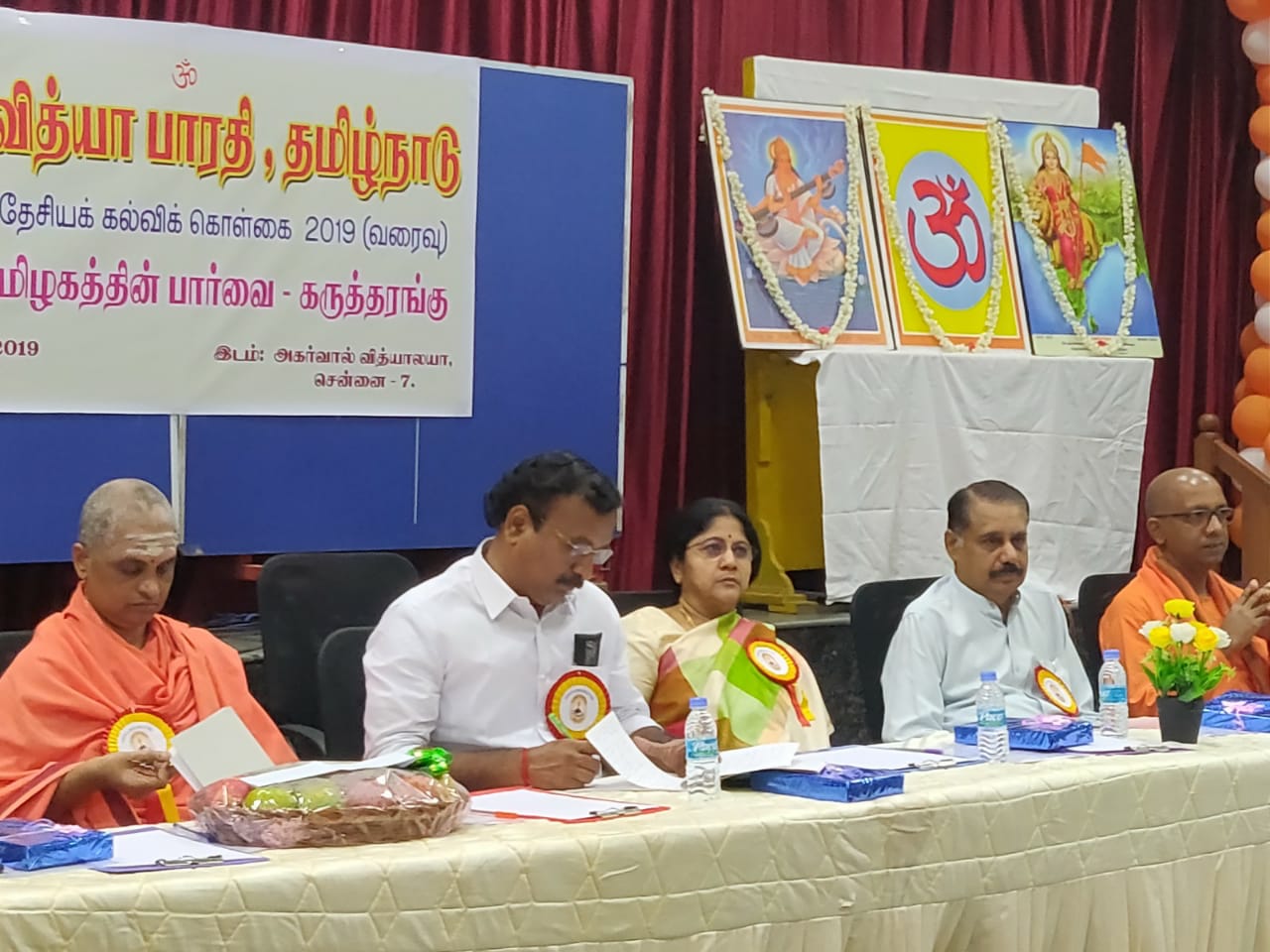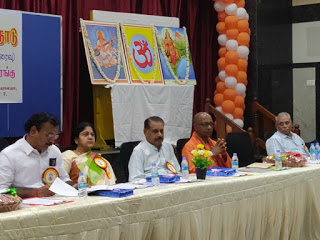VSK TN
Vidya Bharathi, Tamilnadu had organized a seminar on the draft of the NATIONAL EDUCATION .POLICY 2019 to discuss on the “TamilNadu perspective” on Saturday, 22nd June :019, at Agarwal Vidyalaya, Chennai.
Eminent educationists, Journalists. Principals. Correspondents of schools, representatives from teacher’s association. spiritual leaders. social workers and many such others involved in education, participated and had given their opinions and suggestions.
Based on the discussions held in the seminar, the following were resolved unanimously.
1. The proposal on a new developmentally appropriate curriculum and pedagogical structure for school education based on principles of brain development and learning to be developed based on a 5+3+3+4 needs a welcome note. It emphasis on all subjects- science, social sciences, art, languages, sports, mathematics with integration of vocational and academic streams in school would create an integrated and balanced development in students.
2. Vocational education being an integral part of education, providing access to vocational education to at least 50% of all learners by 2025 is a welcome move since it would create more opportunities for self sustenance.
3, The concept of School Complexes, comprising a number of schools with proximity, is a welcome move since it aims to provide academic autonomy in examination, sharing among the schools resource including teachers, sports, music and art teachers, counselors and social workers. This grouping exercise will also include review and consolidation with very low enrolment (eg < 20 students)
4. The School Complex System aims for comprehensive teacher development programmes in synchronization with District Education Institutes and the Block and Cluster Resource centers. This will enhance the; quality and skill of the teachers and provide better teaching standards.
5. Creating Special Education Zones in disadvantageous regions with substantial central government funding will enable inclusive education for under represented groups. Central government providing financial support in the ratio of 2:1 to the State governments is appreciated.
6. The policy will ensure the preservation, growth and vibrancy of all ‘Indian languages. It honours the classical languages like Tamil and creates awareness to appreciate and protect them by providing opportunities to teach and learn them in schools all over the country.
7. The proposal to implement three language formula throughout the country is a welcome move since it offers an opportunity for the local student to learn another Indian language, and for the students of a particular state pursuing studies in another state to learn his mother tongue as third language. The move also enables students to learn Samskritharn, Urdu or Prakrit as a third language in support of their main studies in Ayurveda, Unani or Homeopathy.
8. Education in the local language/mother tongue till Grade 5 preferably till Grade 8 with a flexible (bilingual) language approach would create interest in learning and better understanding of the concepts. The proposal to impart legal education in bilingual study will re-orient the law students to appreciate Bharateeya system of living, beliefs and faiths.
9. Students pursuing Vedic and Samskritham studies or literature in their vernacular languages through non-formal education system must also be considered eligible to be conferred with the integrated B.Ed degree after necessary’ qualifying examination.
10.While we welcome the proposed accreditation system for primary school education, we caution that the same could become a tool for profiteering and exploitation.
11.Vidya Bharathi Tamilnadu welcome the proposal to create a National Language and Maths repository. This will be a cost-effective alternative to smart classes and have a wider reach due to its multilingual presentation.
12. While the proposal to broaden Right to Free Education(RTE) from the age of 3 to 15 will go a long way in addressing the goal of Universal Education, it will be complete only if the religious minority educational institutions are also brought within the ambit of RTE Act. Religious minority institutions constitute a majority among the school educational institutions and the present exclusion pushes a heavy financial burden on the few general schools. If the RTE act is made applicable to minority religious institutions, it would substantially facilitate Universal education.
13. The policy on adult education aims at 100 % literacy among the youth and adults by 2030. While Vidya Bharathi appreciate the noble aim of the Government, it caution that it will be an exercise in futility to provide universal education through schools alone. The Government should come up with inclusive initiative to evaluate and accredit non-formal education to achieve the goal.
14.The four year B.Ed integrated course will produce professional teachers with specialization in various subjects of their choice. The vacancies in educational institutions may not exactly match the specialization of the teachers. The availability of qualified teachers with specialization in languages and social science is very limited. Hence there is a need to re-orient and impart training in the required subjects by the institutions offering employment. However such training will finally be evaluated by the Government and additional accreditation can be given to the qualified teacher. Every educational institution should therefore be enabled to offer in-house training on several subjects for the purpose of additional subject of accreditation.
15. The proposal to guarantee employment to tribal, rural and girl students after completing four year integrated B.Ed programme is appreciated We suggest that appropriate incentives/fellowships to be provided for such students pursuing postgraduate and doctoral qualifications also.
16. The proposal to provide breakfast in addition to midday meal for promoting equitable and inclusive education will address the nutrition needs of the under privileged children and shall also reduce the ratio of school dropouts.
17. The proposal to provide financial support by way of scholarship to individual students through a National Fund will go a long way in addressing the needs of students from under privileged group. Tamilnadu Govt is providing free education, uniform, books, mid-day meals, bicycle, laptops and transport in Govt Schools. (The proposed Scholarship through National Fund should be provided as additional benefit to such students. The support by way cost-free necessities and scholarship should be uniform Throughout the country) This may arrest dropouts in schools besides preventing children from being drawn into child labour.
18.The formation of Rashtriya Shiksha Aayog or National Education Commission headed by the Prime Minister is a welcome move. The Aayog will be the custodian of education in our country and would integrate the national vision of education. Setting up of state level apex bodies would give
required freedom to the states in educational policy making.
19. While the proposal to set up state School Regulatory Authority will bring about uniformity and reduce red tape, the proposal to empower parents as de-facto regulators is not advisable as it would promote irresponsible activism and anarchy in the school environment.


